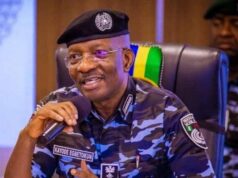
It is a settled issue that the traditional role of soldiers anywhere in the world is to defend the territorial integrity of the country. That means that soldiers are trained only to fight wars: to shoot and kill anybody anytime they are called out.
Arising from such role is the relevant training they are made to go through. In deed, they are trained to be highly disciplined and to imbibe the culture of humility in service, especially, towards those who are not armed, even if they are soldiers like themselves.
Of course, certain security exigencies have necessitated the drafting of Nigerian soldiers into the streets, to perform the traditional role of police in ensuring internal peace and orderliness in the country.
There is no quarrel with this new role, but what is happening is that some of the soldiers are fast losing the culture of discipline and even humility that has, over the years, endeared them to members of the civil society.
As a matter of fact, some of the soldiers posted to take part in restoring peace in many parts of the country devastated by security challenges, and even some of them that are now at road blocks across the North are either turning brutal, corrupt by way of demanding for gratification from members of the civil society or are doing those things police men have been doing that make them notorious and hateful.
Only yesterday, Wednesday, a report was published by a medium that a soldier got drunk somewhere around the South Western part of the country, and under the influence of alcohol, shot and killed three civilians.
Last week Tuesday, a senior Journalist/editor, who closed at about 2.30 am after an engaging assignment in the state House, narrowly escaped being shot and killed at around the National Stadium by drunken soldier on patrol. It was the colleague of the soldier that stopped him from shooting the journalist, even though he stopped when he was asked to stop and even put on the inner light of his car immediately he stopped for the soldiers to see him.
And so too, I suffered the brutality of a soldier on Kuje road on Tuesday this week.
As I was driving home in rain at about 9.15 pm, I met a line of cars stretching about two kilometres from the point where the soldiers mount road-block for checking.
I decided to park on the pedestrian path to enable me urinate before continuing with the journey. But, immediately I veered into the pedestrian path, a soldier lurking around all alone, emerged from the other side of the road, running and shouting menacingly on top of his voice that I should stop.
Before I could march the brakes, he was already all over my car. Without a word of question from him and not knowing who I was, he began to hit the bonnet and side of the car severally with butt of his gun. By the time he finished bashing my car with dutiful gusto, my car had been thoroughly dented. The car actually looked as if I had an accident with it.
When I made a feeble attempt to identify myself, the soldier, who obviously was under the influence of alcohol threatened to shoot me if I utter a word. He was even angered by my word of friendliness despite what he did to me. He shouted: “If you say God should bless me, I will shoot you and destroy your car.”
That could be one of the few isolated cases anyway, for, I have come across many soldiers who are still very nice and maintain the tradition of good mannerliness: some of them would even greet you politely with respect, the same way they would do to their fathers, commanders and elders.
However, the few ones that often operate under the influence of alcohol are fast turning soldiering into another form of Nigerian version of policing.
It would be too bad if the military high commands would allow such drunken soldiers to reduce the beautiful tenets of soldiering into another institution that would lose the respect of Nigerians.
It is heartening to know that the high commands are following the bad ones with keen interest, as nine of such soldiers were said to be undergoing court-marshall for their role in the crisis in Nasarawa state.
Nigerian soldiers cannot afford to join the police band wagon, not even at this auspicious time when the police high authorities are finding ways to weed out the bad ones in the service to stem the eternal embarrassment the force has been thrown into.
Our soldiers must be made to understand that being Nigerians with Nigerian blood running in their veins should not be used as an excuse to behave true to Nigerianness.
Soldiers anywhere in the world should have and, of course, do have their code of ethics and manner of interaction with ordinary civilian members of the society.
Ours should not be seen to behave outside such code, irrespective of the circumstances under which they operate.
On the whole however, I must remember to thank God that the frightening looking drunken young soldier did not open fire on me that night and later turn around to say that he killed me “after an exchange of fire with an armed robber or a Boko Haram member!”
And probably gets promoted later for gallantry!






